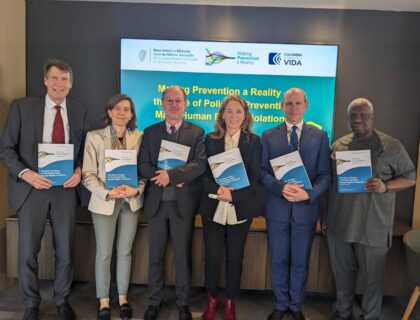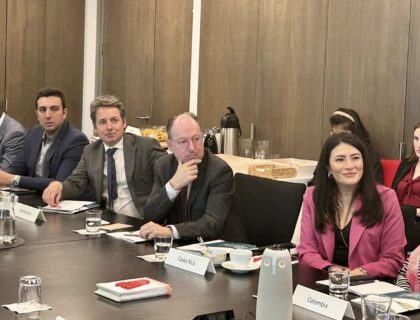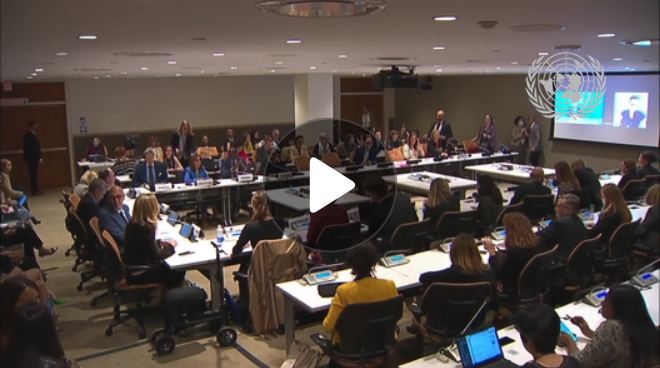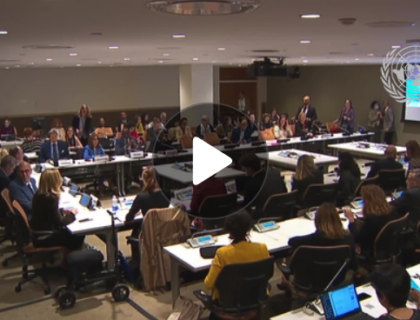PREVENTION AND CONFLICT
The Prevention Project
The Center has been at the forefront of efforts to identify and prevent emerging threats to human rights stemming from evolving national security policies and practices. This shared mission of shifting from rhetoric to a methodical approach of decision-making and addressing the need to expand and strengthen prevention practices stems from the work of Pablo de Greiff as a UN special rapporteur, and subsequently the work of the prevention team at the Center.
The Prevention Project seeks to broaden and upstream global efforts to prevent mass human rights violations and abuses. The project’s mission is to make prevention a reality by transforming global prevention practices to be more effective, systematic, proactive, and contextually relevant.
Although the need for effective prevention strategies is broadly acknowledged, pre-existing efforts have largely been fragmented, reactively focused on crisis prevention, and centered around the role of international actors. As a result, interventions often occur too late to prevent mass human rights violations and abuses, and a top-down approach prioritizing international processes may have little appeal to national actors best positioned to implement human rights protections.
Such an approach entails limited flexibility in adapting to different contexts and stokes apprehensions about foreign interventions in the sphere of national sovereignty. In espousing a “framework approach to prevention,” the project—which rests upon an interdisciplinary process for generating nationally led, evidence-based prevention strategies—seeks to overcome the fragmented and “scattershot” approach that has dominated thinking about prevention. The array of thematic reports stemming from this project thus constitute “elements” of a comprehensive prevention framework, rather than proposals for isolated initiatives.
Recognizing that innovative prevention efforts are taking place in silos—by region, by field, and between international, regional, and national actors—the project aims to remedy this fragmentation by connecting academics and practitioners across different fields within expert communities of practice organized into thematic workstreams. Each community of practice is composed of a diverse, globally distributed body of experts, and each workstream produces reports with actionable policy recommendations—informed by the leading research and direct experience with on-the-ground implementation—to be implemented primarily at the national level (with or without international support). The project also explores linkages between these thematic workstreams to connect experts in different fields and, ultimately, to build a comprehensive and unified framework of evidence-based prevention strategies that can be tailored to different national contexts.
The work of the project serves to advance global prevention efforts in three ways:
- by producing peer-reviewed knowledge on evidence-based prevention strategies to be applied at the national level, informed by real-world expertise;
- by helping to change prevention practices by introducing the project’s emerging results into various processes at the UN and, gradually, directly to members states; and
- by creating connections between prevention experts and government and civil society actors to unite academics, practitioners, and policymakers across regions, institutions, and fields of expertise.
The workstream communities of practice are the crux of the connection between knowledge production and practice transformation. It is through these expert communities that the project functions as a research engine developing effective prevention strategies, a hub for facilitating collaboration on prevention initiatives, and a laboratory for testing and refining future efforts.
The process is just as important as its outputs, and so this work is necessarily iterative. Over time, a growing expert community will explore additional themes and topics, with each iteration building upon an expanding body of knowledge and coalescing into a unified yet dynamic framework of interrelated prevention strategies.
- Constitutional and Legal Tools: initiatives that strengthen the preventive potential of official civilian institutions, especially in the legal and justice sector, including opposition party regimes and constitutional reform measures that reduce violence and conflict.
- Security: initiatives relating to the security sector, including the preventive potential of community and ‘place-based’ policing strategies, and civilian oversight mechanisms over the armed forces.
- State Capture: initiatives to address inequalities, different forms of socio-economic marginalization and corruption, focusing on strategies to overcome state capture.
- Strengthening Civil Society: initiatives to strengthen the preventive potential of non-state institutions, focusing on measures to strengthen civil society.
- Psychosocial Support: initiatives seeking changes in the domain of personal dispositions, focusing on the provision of psycho-social assistance to survivors.
- Culture: interventions in the sphere of culture, including broad initiatives that strengthen solidarity and tolerance through education, arts and culture, memorialization and documentation.
project deliverables
Report
A Framework Approach to Making Prevention a Reality
In espousing a “framework approach to prevention,” the project—which rests upon an interdisciplinary process for generating nationally led, evidence-based prevention strategies—seeks to overcome the fragmented and “scattershot” approach that has dominated thinking about prevention.

Report
The Role of Police in Preventing Mass Human Rights Violations
There are concrete measures that states and police forces can take to ensure that policing contributes to the prevention of mass human rights violations.

Report
Making Constitutional Promises Credible: The Preventative Potential of Guarantor
This report argues that human rights are part of a family of norms that rise and fall together. Thus, states should not only guarantee human rights norms directly, but also by guaranteeing allied norms that directly or indirectly aid the prevention of human rights violations.
Report
State Capture as Enabling Condition for Human Rights Violations
This report underscores the multifaceted nature of state capture, emphasizing that it is a dynamic process that unfolds over time, is a matter of degree, and is characterized by nonlinear movement; states may advance or regress within the spectrum of capture.
Report
Mental Health & Psychosocial Support
This report argues for the preventive potential of MHPSS on the basis that trauma is not an auspicious mindset for assuming the role of a rights-claimant, which is instrumental for prevention and non-recurrence.
Report
Preventing Mass Human Rights Violations in the Context of Climate Crisis
This report focuses on the prevention of mass human rights violations occurring in the context of the climate crisis and actions taken to mitigate its effects.




